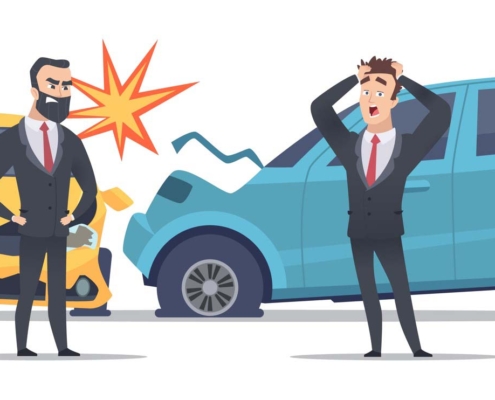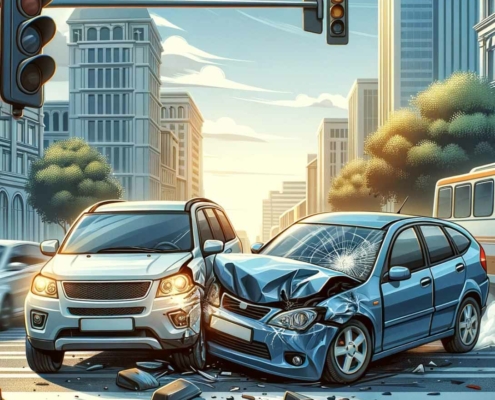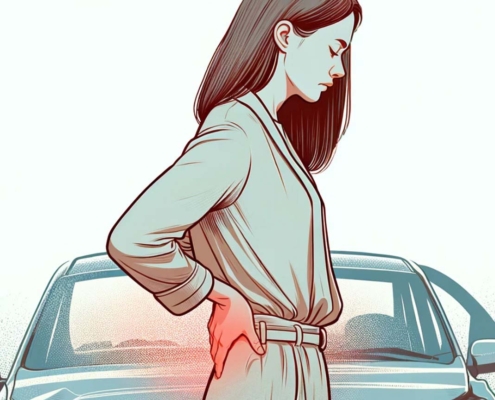What Types of Brain Injuries Can Car Accidents Cause?
The CDC reports that an estimated 214,000 TBI related hospitalization each year. A car accident can result in many different kinds of injuries, though few are as concerning as a brain injury. In fact, car accidents are one of the leading causes of brain injuries. This is because people in crashes are subjected to blows, jolts, and bumps on the head. Such injuries come in a number of forms, some appearing immediately and others appearing over time. Whether they reveal themselves instantly or down the road, brain injuries can be serious. A brain injury from a car accident requires immediate medical attention. An individual should be sure to seek treatment upon noticing the first signs of a potential brain injury. Also, contacting a traumatic brain injury lawyer for car accident means having a dedicated attorney to fight for the victim’s best interests and well-being.
Following the traumatic car crash, the victim may have suffered a severe brain injury. They are also referred to as traumatic brain injuries. The following are types of brain injuries known to occur as a result of car accidents.
- Concussion: One of the most common and recognizable kinds of brain injuries from car accidents are concussions. This is a kind of brain trauma that occurs as a result of an impact, sudden momentum, or change in movement. Concussions typically come with a loss of consciousness. Sometimes, concussions may present with less severe symptoms in the form of dizziness or confusion. If an individual does not seek medical attention, untreated concussions can cause severe or permanent damages.
- Contusion: Contusion is another word for bruise. That said, bruises on the brain are nothing to sniff at, and can be quite complicated in nature. In fact, severe contusions may require surgical procedures to remove. When contusions appear on both sides of the brain, the injury is referred to as coup-contrecoup. This indicates that bruises occurred on the site of impact and the opposite side as well. They are essentially double bruises. Contusions can also occur in the form of pain and swelling. They can result in risks such as a blood clot in the brain, memory challenges, difficult speaking, and changes in cognition.
- Diffuse Axonal: This injury happens when the brain structures tear as a result of severe rotation of the head. This is a kind of serious concussion that can cause side effects including seizures, severe headaches, migraines, and memory loss. In bad cases, this kind of brain injury from a car accident can cause coma or death. Milder cases may be treated with rehabilitation.
- Penetration: As the name suggests, penetration is an injury involving an object penetrating the brain. This is an injury simple to identify. Blood oozing from the head would indicate a penetration. The penetration may be of varying depth. Symptoms of a penetration injury include blood loss, difficulty breathing, and fatigue.
- Coup-contrecoup: This type of brain injury means that both sides of the brain have been injured. Coup refers to the impacted side, while contrecoup refers to the opposing side. These kinds of injuries happen when the brain experiences a sudden movement inside the skull. Violent or forceful car accidents, including rollover crashes, can cause this kind of head injury. Because the impact force, both sides of the brain are damaged as the organ strikes the inside of the skull.
- Acquired Brain Injuries: These types of injuries are not caused by the traumatic force of a crash. Rather, these injuries can result from blood loss, chest complications, throat injuries, and lung and rib damage that leads to conditions which affect the brain. When an individual seeks medical treatment after a crash, these conditions are easily recognizable. In most cases, the doctors can provide an instant fix. When an individual experiences such an injury, they should consider its potential impact on the brain.
- Skull Fracture: If an individual suffers a hard blow to the head, their skull may fracture. This injury typically comes with other brain injuries, such as concussions and contusions. Symptoms of a skull fracture include bleeding from the nose or ears, bruising on the head, and swelling at the site of the impact.
An individual may endure a skull fracture when they hit their head in a car accident. It can happen within the car or if an individual is thrown from their vehicle. A victim’s recovery from a brain injury resulting from a car accident is challenging and takes time. A traumatic brain injury can profoundly alter a victim’s life, and a lawyer understands the unique challenges the victim is facing.
What Are Signs and Symptoms of a Brain Injury to Be Aware of After an Accident?
A person suffering a brain injury from a car accident must see a neurologist immediately. Unless it is severe, a traumatic brain injury can take time to appear. Most individuals tend to ignore them or mistake them for other problems. For instance, an individual may mistake a contusion for a severe headache and take painkillers rather than get a brain scan to check for damage. When an individual does not take instant action, a brain injury can get worse. By looking for the following signs and symptoms, an individual can know when to seek medical attention.
- Difficulty in Thinking and Concentrating: When the brain is damaged, an individual may have trouble thinking quickly. This is because the parts of the brain responsible for cognition are under stress due to bruises or swelling. This can cause them to respond slowly. An individual may also experience memory loss.
Some people may find it hard to concentrate because the parts of the brain in charge of attention and focus are unable to operate normally. If an individual experiences either of these conditions after a car crash, he or she should see their doctor as soon as possible. The effects may only become worse with time if not treated.
- Headaches and Seizures: The most common signs of a brain injury after a car accident are headaches and seizures. Seizures are indicative of severe trauma, while headaches indicate milder damage. That said, if headaches are persistent, even with painkillers, then it would be wise to check for brain trauma or other damage.
- Difficulty Dealing with Emotions: Different parts of the brain are in charge of different functions. The limbic system is the part of the brain that handles emotions. It is located in the central section of the brain, behind the eyes. A car crash may subject this area to extreme forces, which can cause undue stress.
- Period of Unconsciousness After the Crash: When an individual wakes up not knowing where they are or how long they have been out, they likely just passed out. When this occurs, they should seek medical treatment. This is because the brain may be under stress, or certain regions of it may be damaged.
- Other signs and symptoms of brain trauma include the following:
- Numbness in limbs
- Dilated or uneven pupils
- Confusion
- Light or sound sensitivity
- Coordination or balance difficulty
- Extreme fatigue
- Low level of alertness
- Nausea
Navigating the complexities of a traumatic brain injury lawsuit requires a lawyer with experience in handling these types of cases.
When Should a Person Get Medication for Brain Injuries?
If an individual experiences any of the above symptoms for TBI, he or she should go to a hospital as soon as possible. That said, it is best to seek medical attention directly after a car accident. A doctor may conduct brain scans to check on its condition, depending on the type of accident.
Sometimes, a brain injury may take time to reveal itself after a car accident. However, it can still be severe when it shows up. It is therefore important to invest in early remedies or preventative measures after an accident, in order to ward off mental illnesses or memory losses. A traumatic brain injury lawyer can help the family of the victim seek medical care and rehabilitation.
What Is the Difference Between Mild and Severe Head Injuries?
It is very common to receive a head injury in a car accident. A head injury can either cause minor pain that disappears within a few days or more severe damage that lasts for a long time. It can be difficult to determine the severity of a head injury after a car accident. A severe brain injury from a car accident will adversely impact a person’s quality of life.
Head injury, brain injury, and traumatic brain injury (TBI) are terms that generally mean the same thing. A head injury may also be referred to as a concussion. These words may be used to describe a number of types of trauma affecting the head. A traumatic brain injury lawyer can guide the victim’s family through the legal process and ensure the victim’s rights are protected while you focus on recovery.
Mild to Severe Head Injury Symptoms
Depending on the severity of a head injury, there may be different symptoms. Side effects can be used to identify a mild case versus a more serious head injury. Still, it is wise to visit a doctor to determine what is going on after a car accident.
Mild head injuries are called concussions, and they are particularly common after a car accident. Mild head injuries can cause symptoms such as the following:
- Headaches
- Mild confusion
- Nausea
- Temporary tinnitus (ringing in the ears)
- Dizziness or balance problems
- A swollen or raised bump
- Blurry vision
- Fatigue or irritability
- Trouble focusing or remembering
- Sleep disruption
Severe head injuries usually need immediate medical intervention. Other than the side effects that come with mild head injuries, more severe head injuries have the following symptoms:
- Severe headaches that do not go away or get worse
- Losing consciousness or going into a coma
- Locked-in syndrome (cannot move or speak)
- Slurred speech
- Nausea or vomiting that persists
- Seizures or convulsions
- Clear fluid leaking from the nose or ears
- Short-term memory loss
- Behavioral changes, such as mood swings or irritability
- One dilated pupil
- Open head wounds
Every case is unique, so a head injury may involve different or additional symptoms and side effects. The aftermath of a car accident brain injury will be life-altering for a victim.
If an individual is involved in a car accident, it is crucial they see a doctor afterward. He or she should inform their doctor of any head-related pain or any of the above-mentioned side effects. Head injuries sometimes look and feel like other medical conditions, so it is important to get a physical exam.
Also, if an individual suffers a head injury in a car accident, he or she may have legal rights to exercise. If another driver is liable for the crash, the victim may be able to get a settlement to pay for their medical expenses. Our traumatic brain injury lawyers will work tirelessly to secure maximum compensation for the victim and the family.
Brain Injury from Car Accident Symptoms
Unless it is severe, a brain injury can take time to appear. Most individuals tend to ignore them or mistake them for other problems. For instance, an individual may mistake a contusion for a severe headache and take painkillers rather than get a brain scan to check for damage. When an individual does not take instant action, a brain injury can get worse. We can’t emphasize enough the seriousness of the car accident brain injury and the challenges the victim faces in their recovery. By looking for the following signs and symptoms, an individual can know when to seek medical attention.
Difficulty in Thinking and Concentrating
When the brain is damaged, an individual may have trouble thinking quickly. This is because the parts of the brain responsible for cognition are under stress due to bruises or swelling. This can cause them to respond slowly. An individual may also experience memory loss. The consequences of the brain injury from the car accident include cognitive impairment.
Some people may find it hard to concentrate because the parts of the brain in charge of attention and focus are unable to operate normally. If an individual experiences either of these conditions after a car crash, he or she should see their doctor as soon as possible. The effects may only become worse with time if not treated.
Headaches and Seizures
The most common signs of a brain injury after a car accident are headaches and seizures. Seizures are indicative of severe trauma, while headaches indicate milder damage. That said, if headaches are persistent, even with painkillers, then it would be wise to check for brain trauma or other damage.
Difficulty Dealing with Emotions
Different parts of the brain are in charge of different functions. The limbic system is the part of the brain that handles emotions. It is located in the central section of the brain, behind the eyes. A car crash may subject this area to extreme forces, which can cause undue stress. Dealing with the effects of the car accident brain injury will be a constant uphill battle and require resilience from the victim.
Period of Unconsciousness After the Crash
When an individual wakes up not knowing where they are or how long they have been out, they likely just passed out. When this occurs, they should seek medical treatment. This is because the brain may be under stress, or certain regions of it may be damaged.
Other signs and symptoms of brain trauma include the following:
- Numbness in limbs
- Dilated or uneven pupils
- Confusion
- Light or sound sensitivity
- Coordination or balance difficulty
- Extreme fatigue
- Low level of alertness
- Nausea
Rehabilitation may mitigate the effects of brain injury stemming from a car accident.
When Should a Person Seek Immediate Medical Attention After an Accident?
The consequences of the brain injury from the car accident include cognitive impairment. The Centers for Disease Control and Prevention (CDC) reports that blood clots can sometimes form in the brain. The clot may put pressure on the brain, which constitutes a life-threatening condition. It is wise to seek medical attention after an accident that may have caused a head injury – even if it is not obvious. An individual should go to the emergency room as soon as possible if they have symptoms such as the following:
- Headaches that stay or get worse
- Drowsiness or not being able to wake up
- Slurred speech
- Loss of consciousness
- Numbness or weakness
- Poor coordination
- Recurring nausea or vomiting
- One pupil that is larger than the other
- Not being able to recognize people or places
- Seizures or convulsions
- Confusion, restlessness, or agitation that persists
The above are common symptoms of severe head injuries. It is important not to ignore signs of a severe head injury. An individual with these symptoms may need emergency medical treatment to avoid serious or potentially fatal outcomes. The road to recovery from a car accident brain injury will be demanding, and the victim must have the determination to go through it.
How Does a Doctor Diagnose a Head Injury?
A neurologist’s evaluation is required for a brain injury sustained from a car accident. Normally, a doctor will order diagnostic tests to check an individual’s head for brain injuries. A doctor will also likely perform a physical exam. They will look for cuts, bruises, and bleeding. The doctor will also ask the patient how they received the injuries, and the victim should describe the car accident. By seeing a doctor, an individual will create a record of seeking medical attention after the accident. If someone else caused the crash, then medical records will help reinforce an injury claim.
A doctor may perform the following tests to diagnose a head injury:
- X-rays to get images of the head and brain
- CT scans and MRIs to create detailed images of the brain
- EEGs that record brain activity
- Blood tests that check for unnatural changes in the body
The journey of dealing with a car accident brain injury will require emotional strength and endurance from the victim’s family members.
Why Should a Person Seek Compensation for a Brain Injury?
A car accident brain injury attorney can help get money from the liable person to cover brain injury treatment costs and future medical care. If an individual was involved in a car accident caused by someone else, then he or she may file a claim for compensation for their brain injury. An attorney can assist a victim with a brain injury from a car accident and get compensation from the liable person.
In a lot of cases, getting compensation is the best way to. Resume one’s normal life. Brain injuries can have devastating effects, such as:
- Long-term disability
- Inability to work for take care of oneself
- Enormous medical bills
- Memory loss
- Harm to personal relationships
- Reduced quality of life
An individual may be able to get compensation for these damages, among others, with the help of an experienced brain injury lawyer. A lawyer’s experience with traumatic brain injury cases ensures that every aspect of the victim’s medical care is considered when seeking compensation.




























